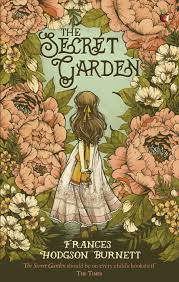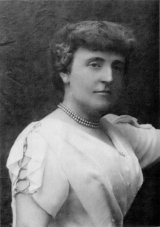The Secret Garden Page #24
The Secret Garden is a novel by Frances Hodgson Burnett first published in book form in 1911, after serialization in The American Magazine. Set in England, it is one of Burnett's most popular novels and seen as a classic of English children's literature. Several stage and film adaptations have been made.
“Who did tha’ ask about it?” she inquired. “I haven’t asked anybody yet,” said Mary, hesitating. “Well, I wouldn’t ask th’ head gardener. He’s too grand, Mr. Roach is.” “I’ve never seen him,” said Mary. “I’ve only seen undergardeners and Ben Weatherstaff.” “If I was you, I’d ask Ben Weatherstaff,” advised Martha. “He’s not half as bad as he looks, for all he’s so crabbed. Mr. Craven lets him do what he likes because he was here when Mrs. Craven was alive, an’ he used to make her laugh. She liked him. Perhaps he’d find you a corner somewhere out o’ the way.” “If it was out of the way and no one wanted it, no one could mind my having it, could they?” Mary said anxiously. “There wouldn’t be no reason,” answered Martha. “You wouldn’t do no harm.” Mary ate her dinner as quickly as she could and when she rose from the table she was going to run to her room to put on her hat again, but Martha stopped her. “I’ve got somethin’ to tell you,” she said. “I thought I’d let you eat your dinner first. Mr. Craven came back this mornin’ and I think he wants to see you.” Mary turned quite pale. “Oh!” she said. “Why! Why! He didn’t want to see me when I came. I heard Pitcher say he didn’t.” “Well,” explained Martha, “Mrs. Medlock says it’s because o’ mother. She was walkin’ to Thwaite village an’ she met him. She’d never spoke to him before, but Mrs. Craven had been to our cottage two or three times. He’d forgot, but mother hadn’t an’ she made bold to stop him. I don’t know what she said to him about you but she said somethin’ as put him in th’ mind to see you before he goes away again, tomorrow.” “Oh!” cried Mary, “is he going away tomorrow? I am so glad!” “He’s goin’ for a long time. He mayn’t come back till autumn or winter. He’s goin’ to travel in foreign places. He’s always doin’ it.” “Oh! I’m so glad—so glad!” said Mary thankfully. If he did not come back until winter, or even autumn, there would be time to watch the secret garden come alive. Even if he found out then and took it away from her she would have had that much at least. “When do you think he will want to see—” She did not finish the sentence, because the door opened, and Mrs. Medlock walked in. She had on her best black dress and cap, and her collar was fastened with a large brooch with a picture of a man’s face on it. It was a colored photograph of Mr. Medlock who had died years ago, and she always wore it when she was dressed up. She looked nervous and excited. “Your hair’s rough,” she said quickly. “Go and brush it. Martha, help her to slip on her best dress. Mr. Craven sent me to bring her to him in his study.” All the pink left Mary’s cheeks. Her heart began to thump and she felt herself changing into a stiff, plain, silent child again. She did not even answer Mrs. Medlock, but turned and walked into her bedroom, followed by Martha. She said nothing while her dress was changed, and her hair brushed, and after she was quite tidy she followed Mrs. Medlock down the corridors, in silence. What was there for her to say? She was obliged to go and see Mr. Craven and he would not like her, and she would not like him. She knew what he would think of her. She was taken to a part of the house she had not been into before. At last Mrs. Medlock knocked at a door, and when someone said, “Come in,” they entered the room together. A man was sitting in an armchair before the fire, and Mrs. Medlock spoke to him. “This is Miss Mary, sir,” she said. “You can go and leave her here. I will ring for you when I want you to take her away,” said Mr. Craven. When she went out and closed the door, Mary could only stand waiting, a plain little thing, twisting her thin hands together. She could see that the man in the chair was not so much a hunchback as a man with high, rather crooked shoulders, and he had black hair streaked with white. He turned his head over his high shoulders and spoke to her. “Come here!” he said. Mary went to him. He was not ugly. His face would have been handsome if it had not been so miserable. He looked as if the sight of her worried and fretted him and as if he did not know what in the world to do with her. “Are you well?” he asked. “Yes,” answered Mary. “Do they take good care of you?” “Yes.” He rubbed his forehead fretfully as he looked her over. “You are very thin,” he said. “I am getting fatter,” Mary answered in what she knew was her stiffest way. What an unhappy face he had! His black eyes seemed as if they scarcely saw her, as if they were seeing something else, and he could hardly keep his thoughts upon her. “I forgot you,” he said. “How could I remember you? I intended to send you a governess or a nurse, or someone of that sort, but I forgot.” “Please,” began Mary. “Please—” and then the lump in her throat choked her. “What do you want to say?” he inquired. “I am—I am too big for a nurse,” said Mary. “And please—please don’t make me have a governess yet.” He rubbed his forehead again and stared at her. “That was what the Sowerby woman said,” he muttered absent-mindedly. Then Mary gathered a scrap of courage. “Is she—is she Martha’s mother?” she stammered. “Yes, I think so,” he replied. “She knows about children,” said Mary. “She has twelve. She knows.” He seemed to rouse himself. “What do you want to do?” “I want to play out of doors,” Mary answered, hoping that her voice did not tremble. “I never liked it in India. It makes me hungry here, and I am getting fatter.” He was watching her. “Mrs. Sowerby said it would do you good. Perhaps it will,” he said. “She thought you had better get stronger before you had a governess.” “It makes me feel strong when I play and the wind comes over the moor,” argued Mary. “Where do you play?” he asked next. “Everywhere,” gasped Mary. “Martha’s mother sent me a skipping-rope. I skip and run—and I look about to see if things are beginning to stick up out of the earth. I don’t do any harm.” “Don’t look so frightened,” he said in a worried voice. “You could not do any harm, a child like you! You may do what you like.” Mary put her hand up to her throat because she was afraid he might see the excited lump which she felt jump into it. She came a step nearer to him. “May I?” she said tremulously. Her anxious little face seemed to worry him more than ever. “Don’t look so frightened,” he exclaimed. “Of course you may. I am your guardian, though I am a poor one for any child. I cannot give you time or attention. I am too ill, and wretched and distracted; but I wish you to be happy and comfortable. I don’t know anything about children, but Mrs. Medlock is to see that you have all you need. I sent for you today because Mrs. Sowerby said I ought to see you. Her daughter had talked about you. She thought you needed fresh air and freedom and running about.” “She knows all about children,” Mary said again in spite of herself. “She ought to,” said Mr. Craven. “I thought her rather bold to stop me on the moor, but she said—Mrs. Craven had been kind to her.” It seemed hard for him to speak his dead wife’s name. “She is a respectable woman. Now I have seen you I think she said sensible things. Play out of doors as much as you like. It’s a big place and you may go where you like and amuse yourself as you like. Is there anything you want?” as if a sudden thought had struck him. “Do you want toys, books, dolls?”
Translation
Translate and read this book in other languages:
Select another language:
- - Select -
- 简体中文 (Chinese - Simplified)
- 繁體中文 (Chinese - Traditional)
- Español (Spanish)
- Esperanto (Esperanto)
- 日本語 (Japanese)
- Português (Portuguese)
- Deutsch (German)
- العربية (Arabic)
- Français (French)
- Русский (Russian)
- ಕನ್ನಡ (Kannada)
- 한국어 (Korean)
- עברית (Hebrew)
- Gaeilge (Irish)
- Українська (Ukrainian)
- اردو (Urdu)
- Magyar (Hungarian)
- मानक हिन्दी (Hindi)
- Indonesia (Indonesian)
- Italiano (Italian)
- தமிழ் (Tamil)
- Türkçe (Turkish)
- తెలుగు (Telugu)
- ภาษาไทย (Thai)
- Tiếng Việt (Vietnamese)
- Čeština (Czech)
- Polski (Polish)
- Bahasa Indonesia (Indonesian)
- Românește (Romanian)
- Nederlands (Dutch)
- Ελληνικά (Greek)
- Latinum (Latin)
- Svenska (Swedish)
- Dansk (Danish)
- Suomi (Finnish)
- فارسی (Persian)
- ייִדיש (Yiddish)
- հայերեն (Armenian)
- Norsk (Norwegian)
- English (English)
Citation
Use the citation below to add this book to your bibliography:
Style:MLAChicagoAPA
"The Secret Garden Books." Literature.com. STANDS4 LLC, 2024. Web. 26 Nov. 2024. <https://www.literature.com/book/the_secret_garden_427>.




Discuss this The Secret Garden book with the community:
Report Comment
We're doing our best to make sure our content is useful, accurate and safe.
If by any chance you spot an inappropriate comment while navigating through our website please use this form to let us know, and we'll take care of it shortly.
Attachment
You need to be logged in to favorite.
Log In